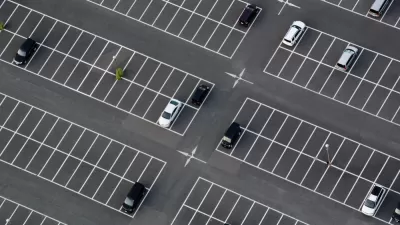The increasing investment value of real estate has led to tangible changes in the way buildings are designed and function, one author argues.

In what Leilani Farha, United Nations special rapporteur on adequate housing, calls "the financialization of housing," the rise in real estate investment has radically reshaped cities and "supersede[d] the traditional role of buildings," writes Nate Berg in Fast Company to introduce an interview with author Matthew Soules.
In the recently published book Icebergs, Zombies, and the Ultra Thin: Architecture and Capitalism in the Twenty-First Century, Soules "argues that value creation is being prioritized over the fundamental purposes of buildings and homes."
"The title of the book calls out three of the ways this is manifesting. Icebergs are the homes of the superrich in London that, due to building height rules, can see their values increased by adding new levels deeper and deeper below ground. Zombies are the half-dead neighborhoods in places like Dublin and southern Spain where speculative development and investment homes often sit empty. Ultra-thins are the tall luxury towers now popping up in cities around the world that serve less as places to live than as places to invest and grow the buyer’s money."
In the interview, Soules explains that these manifestations of finance capitalism are signs of the ways cities are being reshaped to serve capital and increase the liquidity of a traditionally non-liquid asset despite the needs of residents. In Soules' hometown of Vancouver, which is experiencing a huge demand for apartments with two or more bedrooms, "developers continue to build one-bedroom apartments and make their profits this way, to sell out projects over 50% to people who seem drawn to the investment power of the one-bedroom apartments that they then go and rent out, or in some cases let sit empty." According to Soules, "the logics of investment capital are having this slow but profound effect over time, that’s happening so in front of our eyes that it’s hard to even see, of diminishing the social richness of our living environments."
FULL STORY: How capitalism is reshaping cities (literally)

Maui's Vacation Rental Debate Turns Ugly
Verbal attacks, misinformation campaigns and fistfights plague a high-stakes debate to convert thousands of vacation rentals into long-term housing.

Planetizen Federal Action Tracker
A weekly monitor of how Trump’s orders and actions are impacting planners and planning in America.

San Francisco Suspends Traffic Calming Amidst Record Deaths
Citing “a challenging fiscal landscape,” the city will cease the program on the heels of 42 traffic deaths, including 24 pedestrians.

Adaptive Reuse Will Create Housing in a Suburban Texas Strip Mall
A developer is reimagining a strip mall property as a mixed-use complex with housing and retail.

Study: Anti-Homelessness Laws Don’t Work
Research shows that punitive measures that criminalized unhoused people don’t help reduce homelessness.

In U.S., Urban Gondolas Face Uphill Battle
Cities in Latin America and Europe have embraced aerial transitways — AKA gondolas — as sustainable, convenient urban transport, especially in tricky geographies. American cities have yet to catch up.
Urban Design for Planners 1: Software Tools
This six-course series explores essential urban design concepts using open source software and equips planners with the tools they need to participate fully in the urban design process.
Planning for Universal Design
Learn the tools for implementing Universal Design in planning regulations.
Heyer Gruel & Associates PA
JM Goldson LLC
Custer County Colorado
City of Camden Redevelopment Agency
City of Astoria
Transportation Research & Education Center (TREC) at Portland State University
Jefferson Parish Government
Camden Redevelopment Agency
City of Claremont





























